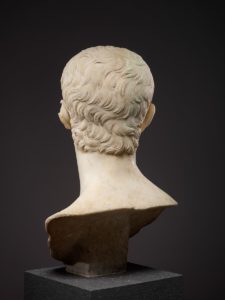
The West’s Darkest Hour isn’t a news site. But it is still difficult not to say at least a word about what has happened in the last few hours regarding Yevgeny Prigozhin’s mutiny in Russia. Media misinformation is such that it is as difficult to know exactly what is happening this very day as it is to make a reliable biography of Caligula: both sources, some from the 1st century and some from the 21st century, are compromised by propaganda.
But back to our topic these days. José Manuel Roldán received his doctorate in 1968 and a few years later obtained the Chair of Ancient History at the University of Granada, and later that of Salamanca. His work has focused on the history of Rome. Despite his credentials, the Spanish historian is a normie. Unlike what William Pierce wrote in Who We Are, much of what we read in Calígula isn’t useful to us. Nevertheless, the book allows me to explain some very important issues.
If the conquest of Germania up to the Elbe was regarded by Caligula as an un-renounceable family legacy (his father wanted to avenge Rome for the defeat of Hermann), the positive image I had of him, after reading that sentence by Eduardo Velasco quoted in the first instalment of this series, immediately collapses. I confess that on this site I stopped quoting Gore Vidal’s novel Julian when I came across the pages in which Julian the Apostate fought against the Germans. (If we recall Who We Are, as quoted in The Fair Race, the pure Aryans were the Germans, not the 4th-century Romans.)
Calígula is reminding me of what Tom Holland said in Dominion: that, although he was an absolute fan of the Greco-Roman world, when he began to study it he noticed some barbaric customs. Pages 40-41 of Calígula for example describe the essential triumphal ceremony in Rome, where white bulls whose horns were gilded and entwined with garlands were then immolated. Caligula himself, at the age of five, went to one of these ceremonies in the triumphal chariot when his father Germanicus was honoured in Rome. But even as emperor the number of animal victims sacrificed during the first three months of his reign has been calculated at one hundred and sixty thousand (page 139 of Calígula).
Regarding humans, an anecdote collected by Tacitus alarmed me. When Tiberius punished the remaining sons of the traitor Sejanus, an innocent daughter of Sejanus repeatedly asked for what crime she was being dragged off for. Historians of the time say that being a virgin she couldn’t suffer capital punishment, so the executioner raped her and then he could legally strangle her! Furthermore, influenced by the histories of William Pierce and Arthur Kemp, I have always sided with Republican Rome and against Imperial Rome. But on pages 178-179 of Calígula we are informed that gladiatorial combats, of Etruscan origin, had been introduced in the middle of the 3rd century b.c.e. And by the end of the 2nd century b.c.e. they had become so popular that the Senate found it necessary to admit them among the public spectacles!
This is not to say that I am, like Holland, making concessions to Christian morality insofar as what we, in Day of Wrath, have called psychogenic emergence is a development of empathy that evolved without the need for Semitic religions. But it’s clear that both Eduardo Velasco, who blogged in his webzine Evropa Soberana, and William Pierce, were wrong to believe that Sparta was the model for the Aryan man when the obvious choice was none other than Hitler’s Third Reich. See what I wrote on pages 481-482 of The Fair Race about the Vikings and the extreme Yang exemplified in Sparta (exactly the same could be said about the ancient Romans).
This prompted me this day to publish a new page, ‘The Sacred Words’ which can be read in red letters at the very top of this site, as well as changing the subtitle once again to The West’s Darkest Hour (the site of the priest of the sacred words).
Precisely because I am a priest of those words, Roldán’s Calígula is having a very different impact on me than I imagined when I bought it (funnily enough, it was the last copy they had at Amazon Books, so I had no choice but to buy it). If anyone has already assimilated my version of Psychohistory in Day of Wrath, he will understand my repudiation of much of classical culture in favour of Hitler’s Third Reich. It is obvious that recent advances in psychogenesis have determined me, and this reminds me of the seminal essay ‘The Red Giant’ (collected in my anthology On Exterminationism), in which a Swede said that some values had to be transvalued to Greco-Roman values and other values to more recent times (say, to Jane Austen’s world).
Like Tom Holland, familiarity with the dark side of the classical world makes me see things about it that I find disturbing and unacceptable. But unlike Holland, I reiterate, I do so not because of Christian morality but because of what we in Day of Wrath call psychogenesis.
One reply on “Caligula, 3”
“Overcoming oneself” is not a bad idea. There is one side exemplified in Confucianism or the tales of the pre-Muslim Arabia – the self-immolation of dutiful children. But there is another side – the chiselling away of the ugly stone to reveal the beauty beneath.
Christianity may be the anarchist, anti-idolatrous creed par excellence, yet it does not mean the idols cannot be improved upon.